- Home
- Andrea Penrose
Murder at Kensington Palace Page 3
Murder at Kensington Palace Read online
Page 3
Wrexford was somewhat reassured by her show of sarcasm. “Yes, I can see that you’re well on the way to recovery.”
She chuffed a snort.
“M-M’lady’s not . . . going to die, is she?”
He turned to see the two boys hovering in the shadows of the doorway, their faces clouded with uncertainty. Growing up in the stews of London, they had no illusions about how swiftly the Grim Reaper’s scythe could strike.
“No, lads,” he answered quietly. “It was just a passing megrim. These things happen.”
“Not to m’lady.” Fists clenched, Raven edged into the room, belligerence not quite covering the flicker of fear in his eyes. The boy had assumed the role of protector to his younger brother and Charlotte—a heavy weight for such young shoulders. “Ye must have done something to upset her.”
“Not intentionally. But if you feel compelled to bloody my beak, we can step out to the garden and settle the matter like gentlemen.”
“Good God, let’s not add any further violence to the morning,” rasped Charlotte. To Raven, she added, “Be assured, His Lordship was no more annoying than usual.”
A grudging grin tugged at the boy’s mouth. “Oiy, well, in that case, I won’t have to thrash him to a pulp.”
“If you wish to be truly useful with your fives,” interjected McClellan, “you and your brother could fly to the greengrocer and fetch me more gingerroot for an herbal tisane.”
As their steps peltered down in the corridor, Charlotte pushed herself into a sitting position. Her gaze, noted Wrexford, avoided meeting his.
“I fear I must have eaten something that disagreed with me,” she muttered. “I’m still feeling rather nauseous.”
She looked ill, but the earl was sure it was not on account of any tainted food.
“Milord, if you would excuse us, I think it best for Mrs. Sloane to retire to her bedchamber,” suggested McClellan.
Charlotte’s eyes remained averted. No question she was hiding something.
“Of course.” He rose without argument. “I’ll see myself out.”
On reaching the street, he climbed into his carriage and leaned back against the squabs as the coachman cracked the whip.
Questions, questions.
Closing his eyes, Wrexford pondered the strange scene that had just taken place. No one—no one!—of his acquaintance possessed the same core of unshakable strength as Charlotte Sophia Anna Mallory Sloane. Not only had she calmly faced terrible revelations about her late husband, which would have crushed a lesser woman, she had also endured death threats to her beloved urchins . . . and charged into danger, time and time again, with no thought to her own safety. Not to speak of her profession, where she had not let the harsh realities of life corrupt her idealism or her commitment to justice and social reform.
Her courage, both moral and physical, was frightening—which made her reaction to the Kensington Palace murder all the more disturbing.
There seemed to be only one logical answer. Lord Chittenden was not a stranger.
A past lover, perhaps?
The idea was more unsettling than he cared to admit. Granted, as a widow, she was allowed more freedom in her personal life than other women. Or ladies, he corrected himself. Charlotte was a highborn lady, which allowed her even more leeway . . .
Pushing such thoughts aside, Wrexford concentrated on the practical question—what was her connection to the murdered baron? For the rest of the ride home, he pondered the possibilities.
“Tyler!” he barked, striding into his workroom without pausing to hand over his topcoat and high-crown beaver hat to the trailing footman.
“Milord?” His valet looked up from the various cauldrons suspended over several flaming spirit lamps. Steam had plastered his red-gold hair to his angular brow. In the glow of the fires, his eyes had a demon-like glow, giving him the look of Vulcan’s apprentice.
“Might I finish adjusting the temperatures before you go on?” added Tyler with an aggrieved sniff. “The process, as you well know, requires precise concentration.”
Wrexford perched a hip on his desk and folded his arms.
After several minutes, Tyler straightened, and wiped his hands on his shirtfront, leaving a gunpowder grey streak on the white linen. “I shall need to cool the liquids in a quarter hour. In the meantime, is there some other task you wish done?”
“I’ll take charge of the chemicals.” The earl quickly scribbled out a few lines on a piece of paper. “I want you to gather all the information you can on this gentleman. I’ve suggested a few lines of inquiry to pursue.” Likely, he would think of more.
As his valet read over the note, a frown tugged at the corners of his mouth. “I thought you said the Bloody Butcher murders had had nothing to do with you.”
Wrexford set aside the pen. “I’ve changed my mind.”
* * *
The sweet-sharp scent of ginger tickled at her nostrils as a gossamer plume of steam floated up from the mug. “Thank you,” murmured Charlotte, accepting the fresh-brewed tisane.
McClellan smoothed a crease from the coverlet. “Is there anything else I can get you?”
“No. A bit of sleep is all I need to put me right.” She forced a smile. “My apologies. My digestion is not usually so delicate.”
McClellan fixed her with an unblinking stare. “No, I don’t imagine it is.” A flick of her fingers banished another wrinkle. “Do you wish to talk about it?”
“About what I ate?” asked Charlotte. “In all honesty, I’ve no idea what it could have been.”
The reply earned a tiny frown and a stony silence as McClellan reordered her tray and prepared to leave.
It deserved worse, thought Charlotte guiltily. She disliked being less than forthright with her friends, but she needed to think.
Think.
If only my thoughts would stop spinning and screaming like wild whirling dervishes inside my skull.
“The lads went out to get you flowers from Covent Garden. I’ll make sure they wait until you’ve woken before presenting them.”
“Thank you,” repeated Charlotte, hating the prim hollowness of her words. She despised the everyday deceptions and manipulations that passed for politeness in the beau monde. The self-serving little lies, the puffed-up conceit.
She took pride in being unflinchingly honest, and yet, like Achilles, she had one elemental vulnerability. Whether it would prove mortal to her present existence remained to be seen.
Aside from Wrexford, she hadn’t revealed her true identity to anyone else yet. She had told him she needed time to consider all the ramifications of such a momentous decision.
One that would irrevocably change her life.
Throwing off the covers, Charlotte rose and moved to the mullioned window overlooking the tiny back garden. A chill prickled against her skin as she pressed her forehead against one of the panes. Her breath fogged the glass, and in the blink of an eye, the familiar tree was blurred beyond recognition.
Vita et praebebit spem fallacem—life is but an illusion.
She had always known, deep down inside, that this day would come. Even before Wrexford had known the truth, he had been challenging, cajoling . . .
Daring her to confront the life she had so painstakingly constructed out of smoke and sleight of hand.
Charlotte stepped back and pressed her palms to her eyes, feeling the hot sting of tears.
“Cedric,” she whispered, finally allowing her grief to well up in a shuddering sob. Cedric was dead. Never again would she see the golden glint of his hair dancing in the wind as they rode neck and leather through the rolling fields. Never again would they help each other translate a particularly difficult passage of Ovid from Latin into English. Never again would they steal apple tarts and gorge themselves out by the lake.
They had been little fiends. Cedric, Nicky, Charley—a trio bent on devil-may-care mischief in those long-ago carefree summers.
Her throat tightened. Dear God—what of Nic
ky? Did he know yet? The two of them had been the closest of friends—twins in spirit, as well as looks. He would be devastated by the news.
Murder, as she had come to know all too well, always had more than one victim.
Pushing aside raw emotion, Charlotte forced herself to regather her wits and think rationally. Chittenden, Chittenden . . . She paid little heed to the social gossip of the beau monde, but she seemed to recall reading that Lord Chittenden had recently taken up residence in London. She had assumed it was Cedric’s father and had thought nothing more of it.
She had long ago made the decision to cut off any contact with people from her previous life. But if Nicky was in Town, the instinct for self-preservation must yield to the bonds of love. She couldn’t—she wouldn’t—remain aloof from the two stalwart friends of her youth.
Murder . . .
“Murder,” she rasped, suddenly recalling that duty demanded she make a drawing of the Bloody Butcher’s latest victim.
For an instant, every fiber of her being rebelled against it. But she quickly silenced the protest. Rather than a betrayal, her art could be a powerful force in provoking the public to demand that the murderous madman be apprehended before he struck again.
After splashing some water on her face and pinching a bit of color back to her cheeks, Charlotte drew a deep breath and headed for her workroom.
Cedric had always been willing to think outside the boundaries of conventional wisdom. She felt sure he would applaud her decision.
* * *
Wrexford looked up from his laboratory ledger at the sound of fast-approaching footsteps in the corridor.
“Back so soon?” he remarked as his valet flung open the door and entered the workroom. “Your efficiency is always impressive, but in this case it seems unusually so.”
“The plot thickens,” said Tyler, punctuating the announcement by removing his hat and shaking off the raindrops. “I thought you would want to know right away.”
“Then kindly stubble the theatrics.” His valet had a penchant for drama. “What have your learned?”
“That Chittenden’s younger brother—younger by naught but a few minutes—has been taken into custody by the Runners and charged with the murder. Apparently, a bloody knife was found hidden in his quarters at the Albany Hotel, along with a silk handkerchief containing a gristly scrap of flesh.”
Good God. A depraved twist to an ugly crime. Wrexford pursed his lips, wondering how Charlotte would take the news.
“You are sure of this?” he demanded.
Tyler nodded. “Aye. On hearing whispers of it at the Royal Institution—where, by the by, both men had frequently been attending scientific lectures and discussions—I made a visit to Bow Street. Griffin had just returned from taking the prisoner to Newgate and confirmed all the details. It’s not yet been released to the public, but the Honorable Nicholas Locke stands accused of fratricide.”
“When is the trial?” asked the earl.
“A date has not yet been set,” answered Tyler. “But I imagine the hangman is already preparing a noose.”
Mr. Locke’s guilt certainly seemed assured. The evidence was glaringly clear. And yet . . .
Wrexford tapped his fingertips together. In his experience, crimes were rarely quite so tidy.
“Do you wish for me to continue investigating Lord Chittenden’s background, milord?” A pause. “That is, the late Lord Chittenden.”
“Yes.” The answers he was seeking lay hidden in the past. And now, more than ever, it was imperative to find them. “And with even greater urgency, if you please.”
Tyler, to his credit, retrieved his sodden hat and, after snapping a quick salute, hurried off.
The earl rose and began to pace. On passing the assortment of beakers and canisters arrayed on the work counter for the next phase of his experiment, he exhaled a harried breath. The demands of chemistry—precise timing and measurement, objective observation, results based on facts, not theory—appealed to his sense of logic. There was an order to science. Rules applied.
He liked the cerebral challenge of figuring them out.
Emotions were messy. Unpredictable.
Though there was a certain commonality, he admitted wryly. Both were capable of exploding in one’s face.
“Bloody hell.” Much as he wished to putter away with his powdered ores and acids, he couldn’t in good conscience keep what he had learned from Charlotte. She needed to know.
Though he doubted she would thank him for it.
“Ah, well, no good deed goes unpunished.” After fetching his hat and coat, he extinguished the Argand lamp on his desk and quit the room.
* * *
Through sheer force of will, Charlotte managed to ink in a detailed picture of the scene—the graceful symmetry of the marble structure, the ominous shadow, the slumped body. It was a strong piece of art, compellingly moody and menacing without showing the horrible details. After the addition of crimson highlights and a suitably scandalous headline, she knew it would sell well.
Mr. Fores would have no cause for complaint.
As for her own feelings, she felt she had danced along a razor’s edge, somehow maintaining her balance in spite of how much it hurt. She could only pray some good would come of it.
A flutter of cheery color caught her eye, drawing her out of her musing. Earlier, the boys had come to her workroom and presented her with a bouquet of flowers to brighten her spirits. Charlotte knew she had frightened them with her momentary swoon. Opening one’s heart to another did not come without perils.
A glance back at her drawing hammered that point home.
Grief cut like a knife, but Charlotte was determined to counter it with a more positive force. She had enlisted Raven and Hawk to make inquiries on whether any of the denizens of the streets around Kensington Palace had noticed anything odd on the night of the murder. Urchins, kitchen maids, street sweepers, night soil men—those who toiled in anonymity were never noticed by the upper classes, but they missed very little of what went on around them.
Charlotte depended on their sharp eyes and ears for her work. She was often better informed than Bow Street on everything that went on in both the high and low neighborhoods of London. She prayed it would prove the same in this particular case.
After adding the splashes of color to her drawing, she carefully rolled the finished art in a length of oilcloth and set it aside for the boys to take to the engravers when they returned home.
Turning her thoughts from Cedric to his brother, Charlotte considered how best to contact him. It wouldn’t be difficult to learn his address if he was living in London. But then—
“Mrs. Sloane?” McClellan gave a tentative knock on the door. “His Lordship has returned, and wishes to have a word with you.” A pause. “He says it’s important.”
Charlotte felt her insides clench. The pain still felt too raw to share. But to refuse to see him seemed lily-livered. Whatever the complexities of their relationship, neither of them had ever taken the coward’s way out of a confrontation.
“I shall be down in a moment,” she replied. Drawing several deep breaths, she sought to steel her spine.
He was standing by the bank of windows, his back to the doorway. Charlotte hesitated before entering the parlor, trying to discern his mood from the chiseled angles of his silhouette. His dark hair, always too long and too wind-snarled to be fashionable, fell over the collar of his coat. The expensive fabric and exquisite tailoring of clothing accentuated the broad stretch of his shoulders and the long, lithe lines of his legs.
He had a careless grace that fit him like a second skin. And yet, he appeared tense.
“To what do I owe the honor of a second visit, milord?” she asked, hoping to sound calmer than she felt.
He turned slowly, and though his face was wreathed in shadows, his eyes seemed to hold a strange uncertainty.
“Please have a seat, Mrs. Sloane. I’d prefer not to have to save you from smashing your skull agai
nst the floor for a second time today.”
A frisson of alarm shot down her spine, but she hid her reaction beneath a sardonic smile. “I daresay you’ll take great amusement for the next little while in needling me over that little display of weakness.” The swoosh, swoosh of her skirts whispered over the carpet as she moved to the sofa. “Now that you’ve had your fun, might we get down to the real reason for your visit? Unlike you, I must work for my bread.”
His expression remained solemn.
Charlotte’s uneasiness ratcheted up another notch. The earl rarely sheathed his sharp sense of humor.
“Be assured, it gives me no pleasure to bring you further news on the murder.” He settled himself rather stiffly in the facing armchair. “But I decided you wouldn’t thank me for it if I held back new information.”
Her hands fisted together in her lap. “Go on.”
The earl took a moment to recross his legs. “Griffin has made an arrest. A bloody knife and . . . other incriminating evidence was found in the man’s rooms, leaving precious little doubt as to his guilt.”
“Who?” Her voice sounded strangely disembodied to her ears.
Again he responded with a very un-Wrexford-like hesitation. His gaze seemed to ripple with sympathy before he answered. “The Honorable Nicholas Locke.”
A fresh wave of nausea washed over her.
“Locke is the younger brother of the victim,” added Wrexford softly. “But I daresay you know that.”
Charlotte swallowed hard, trying to banish the acid burn of bile in her throat. “Griffin’s wrong,” she rasped.
He remained tactfully silent.
“Nicky would never harm Cedric.” Her hands, though clenched, were shaking. “Never.”
“A porter at the Palace overheard a rather violent argument between the two brothers as they were leaving the soiree,” responded Wrexford. “One in which Mr. Locke railed at the unfairness of Lord Chittenden inheriting everything, simply because he had the good fortune to pop out of the womb first.”
“The porter could very well have misunderstood,” she insisted. “Or is making it up to appear important.”

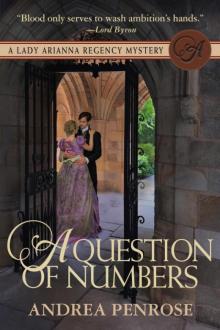 A Question of Numbers
A Question of Numbers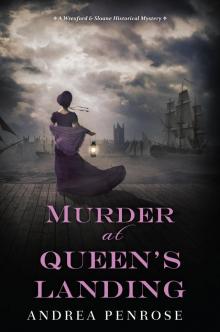 Murder at Queen's Landing
Murder at Queen's Landing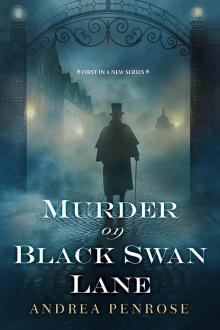 Murder on Black Swan Lane
Murder on Black Swan Lane Sweet Revenge
Sweet Revenge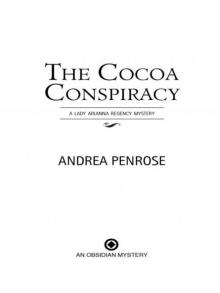 The Cocoa Conspiracy
The Cocoa Conspiracy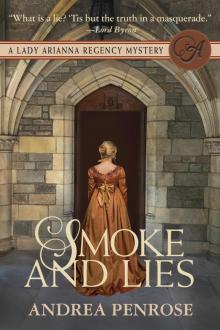 Smoke & Lies
Smoke & Lies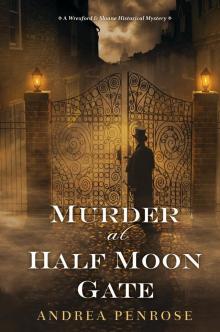 Murder at Half Moon Gate
Murder at Half Moon Gate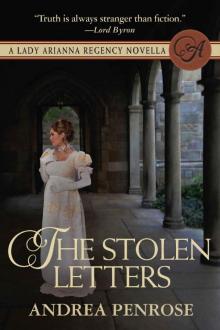 The Stolen Letters
The Stolen Letters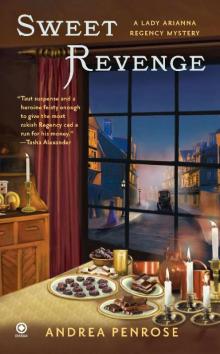 Sweet Revenge lahm-1
Sweet Revenge lahm-1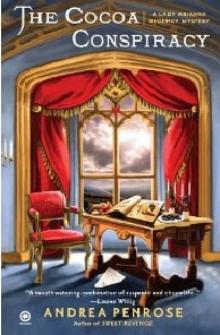 The Cocoa Conspiracy lahm-2
The Cocoa Conspiracy lahm-2